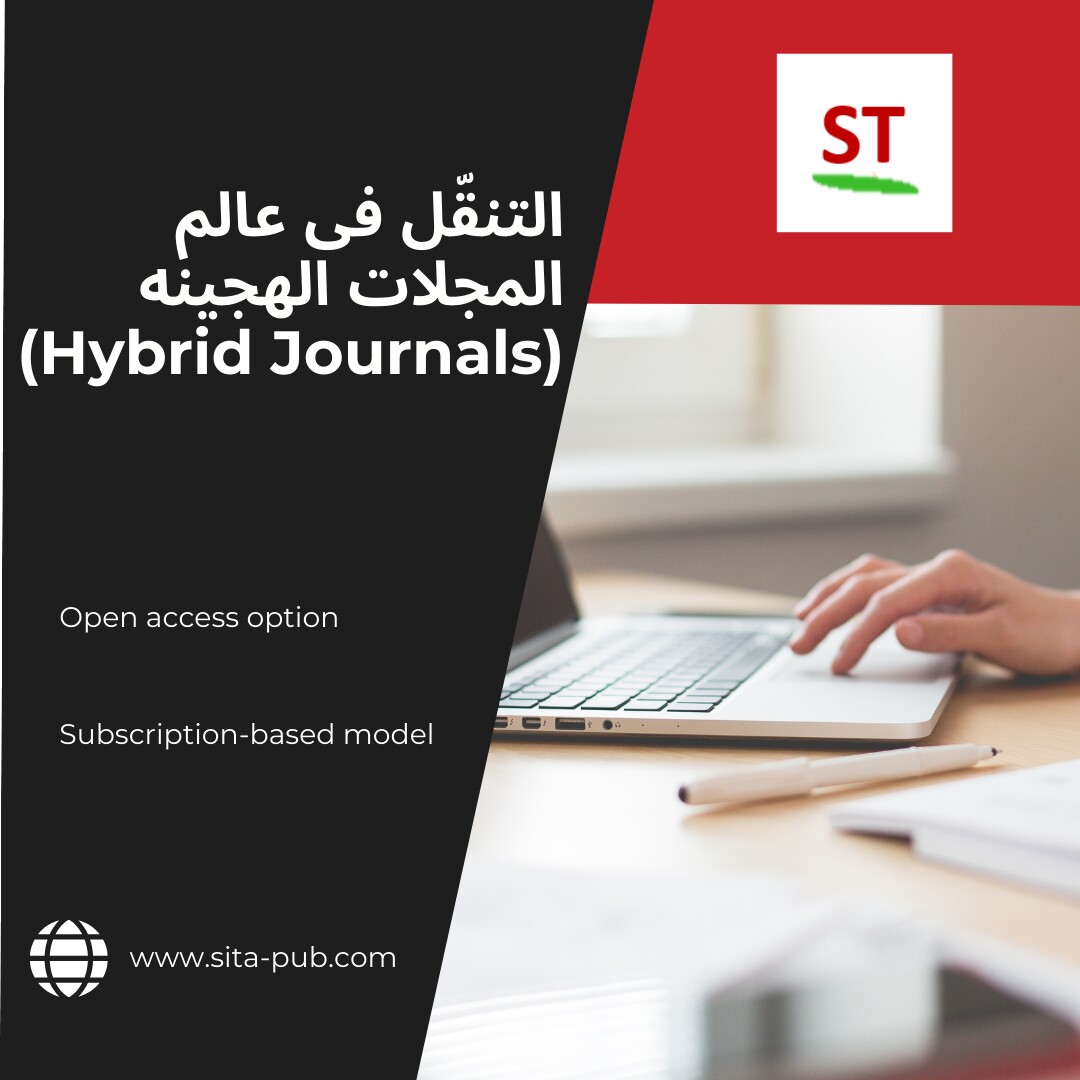التنقّل فی عالم المجلات الهجینه (Hybrid Journals)


المؤشرات الرئیسیه هی:
تستمر المجلات الهجینه (Hybrid Journals) فی استخدام النموذج التقلیدی القائم على الاشتراک، حیث یکون معظم محتواها متاحًا فقط للمشترکین، عادهً للمؤسسات الأکادیمیه أو الباحثین الأفراد.
إلى جانب نموذج الاشتراک، تقدم المجلات الهجینه (Hybrid Journals) للمؤلفین خیار جعل مقالاتهم متاحه مجانًا، وذلک عادهً مقابل دفع رسوم معالجه المقال (APC).

فهم مزایا وعیوب النشر المفتوح والنشر المغلق یساعد المؤلفین على اتخاذ قرار مستنیر.
العیوب
رسوم معالجه المقالات (APC):
یتوجب على المؤلفین أو مؤسساتهم غالبًا دفع رسوم مالیه لتغطیه تکالیف النشر المفتوح، مما قد یشکّل عبئًا مالیًا کبیرًا.
مخاوف من الناشرین المفترسین:
ظهور مجلات مفترسه تستغل نموذج النشر المفتوح أثار تساؤلات حول جوده ومصداقیه بعض المجلات ذات الوصول المفتوح.
فقدان الإیرادات للمجتمعات الأکادیمیه:
المجلات المعتمده على الاشتراک، والتی تنشرها غالبًا جمعیات أکادیمیه، قد تواجه تراجعًا فی الإیرادات إذا اتجه المزید من المؤلفین إلى النشر المفتوح.
المزایا
زیاده الرؤیه والوصول:
المقالات المنشوره بنظام الوصول المفتوح متاحه مجانًا للمجتمع البحثی العالمی، مما یعزز من انتشارها واحتمال تأثیرها.
تسریع تبادل المعرفه:
إزاله الحواجز المالیه یتیح تبادلًا أسرع للأفکار والتعاون بین التخصصات المختلفه.
الامتثال لمتطلبات الجهات المموله:
العدید من الجهات المموله للبحوث تشترط أو تشجع النشر المفتوح، مما یسهل التوافق مع السیاسات التمویلیه.
إمکانیه زیاده عدد الاستشهادات:
تشیر الدراسات إلى أن المقالات المفتوحه غالبًا ما تحظى باستشهادات أکثر من تلک الموجوده خلف جدران الدفع.
العیوب
وصول محدود:
المقالات المنشوره فی مجلات مغلقه تکون متاحه فقط للمشترکین، مما یحد من نطاق وتأثیر البحث.
عوائق أمام نشر المعرفه:
الحواجز المالیه قد تعیق الوصول إلى الأبحاث المهمه، خصوصًا للباحثین والطلاب والمؤسسات فی المناطق ذات الدخل المنخفض.
المزایا
سمعه راسخه وضبط جوده:
المجلات المعتمده على الاشتراک تتمتع غالبًا بـ سمعه قویه ومراجعه صارمه من الأقران، مما یضمن جوده عالیه للمحتوى.
نموذج عمل مستدام:
نموذج الاشتراک یوفر تدفقًا مالیًا مستقرًا للمجلات، مما یسمح لها بالاستثمار فی العملیات التحریریه والحفاظ على الاستدامه المالیه.
وصول حصری للمشترکین:
تُقدّم المجلات المغلقه وصولًا محدودًا یُعتبر میزه للمؤسسات والباحثین الذین یقدّرون المحتوى الحصری.
الخلاصه
تهدف المجلات الهجینه (Hybrid Journals) إلى تلبیه احتیاجات کل من مؤیدی النشر المفتوح ومؤیدی النشر التقلیدی المعتمد على الاشتراک.
من خلال إتاحه الخیار للمؤلفین لنشر مقالاتهم إما خلف جدار دفع أو عبر الوصول المفتوح، توفر المجلات الهجینه حلًا وسطًا، یتیح للباحثین اختیار النموذج الذی یتناسب مع احتیاجاتهم ومصادر تمویلهم.
مع استمرار تطوّر منظومه النشر الأکادیمی، یجب على المؤلفین والمؤسسات والجهات المموله أن یُقیّموا بعنایه مزایا وعیوب النشر فی المجلات الهجینه (Hybrid Journals) لتحدید أفضل خیار لنشر أبحاثهم.

هل تبحث عن طریق لنشر أبحاثک الرائده؟

توفر لک أکادیمیه سیتا قائمه موسعه من المجلات الهجینه (Hybrid Journals).
بصفتها ناشرًا رائدًا فی المشهد الأکادیمی، تمنحک أکادیمیه سیتا مرونه الاختیار بین النشر المفتوح أو النشر القائم على الاشتراک.
توفر المجلات الهجینه (Hybrid Journals) التابعه لـ أکادیمیه سیتا منصه استثنائیه تُمکّنک من عرض أبحاثک للعالم.
سواء کنت باحثًا متمرسًا أو باحثًا ناشئًا، فإن خیارات النشر الهجین التی تقدمها سیتا تساعدک على فهم تعقیدات النشر الأکادیمی وزیاده تأثیر عملک العلمی.
إذا کان لدیک أی أسئله، استفسارات، أو ترغب فی معرفه المزید عن خدماتنا، فلا تتردد فی التواصل معنا. فریقنا المخصص مستعد لمساعدتک.